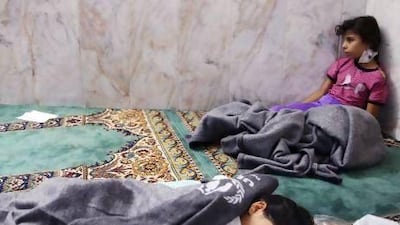Urfa, southern Turkey // Syrian rebels accused Assad regime forces of killing up to 1,300 people in chemical weapons attacks yesterday on the outskirts of Damascus.
As a team of UN experts began work in Syria investigating other alleged chemical weapons strikes, shocking online videos showed victims convulsing in field hospitals, and scores of dead, many of them children, lying in streets or lined up in makeshift morgues.
The opposition Syrian National Coalition demanded the UN chemical weapons team urgently inspect the sites a few kilometres from the city centre, where the 20 experts are staying. Ake Sellstrom, head of the inspection team, said the numbers claimed to have been killed and injured were suspicious but merited investigation. "It looks like something we need to look into," he said.
The inspectors were in talks with Syrian authorities yesterday about access to the affected areas.
The Syrian regime and its supporters said the videos were fabricated and it was ludicrous to suggest loyalist forces would use chemical weapons with a UN team on hand to collect evidence.
"All what has been said is ridiculous and naive, unscientific, illogical and subjective," said the information minister, Omran Al Zoubi.
Opposition activists the attacks took place in the early hours yesterday, with heavy shelling and missile strikes on the rebel-held district of the Ghouta to the east and Moadamiya to the south-west of the capital.
Regime forces have launched an offensive to win back Ghouta and there seem little dispute that an intensive artillery bombardment and airstrikes were directed there yesterday, as they have been on numerous other occasions. Damascus residents said grey smoke was rising on the skyline over the eastern suburbs.
What is disputed is the use of chemicals. As with previous allegations of atrocities and the use of chemical weapons, albeit on a smaller scale, the incident has already broken down into a familiar pattern of claim and counterclaim.
The US, European governments and the Arab League, which have called for Bashar Al Assad to resign, all began a diplomatic push for the UN team to immediately investigate the claims. Russia, the Syrian regime's key backer, called the chemical weapons claims a provocation but appeared to keep open the door for some kind of inquiry.
Under its existing mandate, the UN team can go to only three specific locations, all claimed to have been sites of chemical weapons attacks several months ago. One is near Aleppo, where the regime claims rebels used poison gas.
The other two sites are being kept secret but are probably areas where the regime has been accused of using nerve gas.
The inspectors arrived in Damascus only a few days ago, after prolonged wrangling between the UN and the Syrian authorities over access and security.
Abu Jafa, a member of the opposition Revolutionary Council in Moadamiya, where one of the attacks is said to have taken place yesterday, said he had seen 67 corpses and 150 people injured, with more likely to be trapped under the rubble of collapsed buildings.
"We want the UN inspectors to come in here and see this, we will do all we can to keep blood and tissue samples from the dead, the trouble is we are under siege and nothing can get in or get out at the moment," he said.
He said he believed chemical weapons had hit Rowda street in Moadamiya.
"I have seen many dead people before, but this is the first time I have seen people suffocating and burnt, they seemed to be burnt but not by fire or explosions as they normally are here, this was something different."
Regime supporters on social media sites said the videos were a "revolting fake" and accused the opposition of trying to provoke international intervention in Syria. Some regime supporters also referred to the military offensive in the Ghouta in admiring terms and said "cleaning is under way".
Early reports suggested up to 100 had died but the numbers spiralled rapidly as the day progressed and more video footage was uploaded to social media sites and evidence from residents and activists inside the affected areas was collected.
By yesterday evening the Local Coordination Committees, a network of activists, said 1,360 people had been killed, based on photographs collected at the sites. The SNC said 1,300 had died.
Different casualty figures are common in Syria because the regime refused to allow independent human-rights organisations or journalists to operate freely and the chaos of a brutal civil war makes information difficult to obtain or verify.
In June, the US said it had conclusive proof that regime forces had used chemical weapons, which Barack Obama had previously said would be crossing a red line, and Washington said it would begin to arm rebel factions.
twitter: For breaking news from the Gulf, the Middle East and around the globe follow The National World. Follow us

